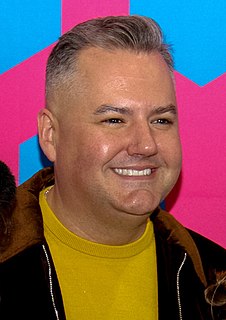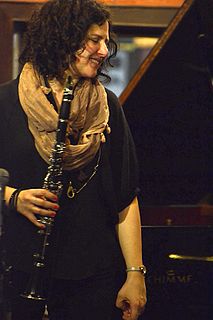A Quote by Hans-Ulrich Obrist
My great inspiration has always been Studs Terkel, who is a wonderful American oral historian. He was a radio DJ at first, interviewed a lot of jazz musicians, and at some point started to interview Americans about work.
Related Quotes
She became politically conscious thanks to Studs Terkel and the radio. She started reading all the books we brought home from college and was a great fan of Noam Chomsky. She was a real lefty and yet was not able to meet her dream of becoming an artist. She got drafted into motherhood big time - seven kids - and that wasn't the life that she had planned. So she opened the path so that I could be the artist that she wanted to be.
I remember reading [ Studs Terkel's] "Working" when it first came out and just finding that very powerful. I was going into community organizing. What stuck was to reveal the sacredness of ordinary people's lives. That everybody has a story. And I think Studs is terrific at drawing out that shimmering quality of people's everyday struggles.
I visited New York in '63, intending to move there, but I noticed that what I valued about jazz was being discarded. I ran into `out-to-lunch' free jazz, and the notion that groove was old-fashioned. All around the United States, I could see jazz becoming linear, a horn-player's world. It made me realize that we were not jazz musicians; we were territory musicians in love with all forms of African-American music. All of the musicians I loved were territory musicians, deeply into blues and gospel as well as jazz.
Oral history is a research method. It is a way of conducting long, highly detailed interviews with people about their life experiences, often in multiple interview sessions. Oral history allows the person being interviewed to use their own language to talk about events in their life and the method is used by researchers in different fields like history, anthropology and sociology.
My biggest inspiration is black America and what they've done in the arts. I have always felt like an outsider in America, and what black Americans have done to add their chapter to this book called the American dream, and to be so unapologetic and true, and have added so much to art and culture in the world. Some of the greatest inspirations in my life have been black Americans. And I just wanted to say thank you. They've been a huge inspiration, to myself and this country.
Usually, you get to interview that one girl who plays the sister on some Disney show - you interview that girl a lot - but sometimes, every once in a while, you get to interview a legend. I have interviewed some amazingly iconic people, including Michelle Obama, Oprah, Sidney Poitier and Judy Dench. These people are legit icons.
I remember I did quite a lot of interviews when the book and the CD came out, and I did a drivetime interview for Radio London or something. You wouldn't immediately associate the music on Ocean Of Sound with drivetime radio, but people found things that they liked, and the DJ was playing some records at 5 o'clock in the afternoon on a weekday.The man who was playing them said to me, "That Peter Brotzmann track, it's like having your head boiled in acid."


































